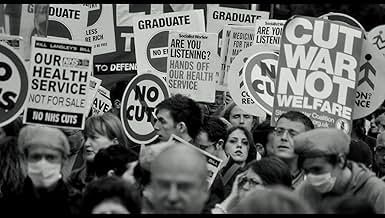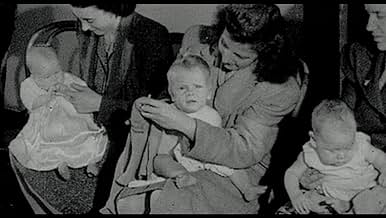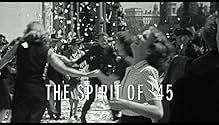AVALIAÇÃO DA IMDb
7,1/10
1,4 mil
SUA AVALIAÇÃO
Adicionar um enredo no seu idiomaA documentary on how the spirit of unity, which buoyed Britain during the war years, carried through to create a vision of a fairer, united society.A documentary on how the spirit of unity, which buoyed Britain during the war years, carried through to create a vision of a fairer, united society.A documentary on how the spirit of unity, which buoyed Britain during the war years, carried through to create a vision of a fairer, united society.
- Prêmios
- 2 indicações no total
Julian Tudor Hart
- Self - General Practitioner
- (as Dr. Julian Tudor Hart)
Harry Keen
- Self - Consultant Physician
- (as Professor Harry Keen)
Jacky Davis
- Self - Consultant Radiologist
- (as Dr. Jacky Davis)
Jonathon Tomlinson
- Self - General Practitioner
- (as Dr. Jonathon Tomlinson)
Avaliações em destaque
"The Spirit of '45" reminds us of the air of progress occurring in British politics immediately after World War II. It takes back to the founding of welfare state and the nationalization of the health service, transport, energy and other areas of public life. The faces we see at the beginning of the film of young Britons celebrating in the fountains at Trafalgar Square symbolize the hope of a nation. But Loach is also worried about the spirit of modern Britain. The second part ponders a different mood than the one of the 1940s: Thatcherism and the more recent failures of organized labor to live up to its founding principles. On the whole this is a tender and humane film, a compelling mix of interviews, with archive footage. The film works all at once as a lament, a celebration and a wake- up call to modern politicians, it's only a bit boring.
In his varied and multi angled study Ken Loach takes us on a journey back in time laying bare the most fair and socially way of running a country.
Despite the devastation caused by the 6 year World War II, Britain looked back and realised that in the pre-War era although it had the biggest ever empire, the levels of poverty and deprivation were embarrassing.
So, following the end of the War, the country followed ultra socialist policies that improved the quality of life for everyone very dramatically following which the documentary follows the changes in attitudes towards social friendly policies and how they impacted the population indicating how the drive towards ever higher profits is eroding the social fabric of this nation.
A contemplating feast and a nostalgic journey.
Despite the devastation caused by the 6 year World War II, Britain looked back and realised that in the pre-War era although it had the biggest ever empire, the levels of poverty and deprivation were embarrassing.
So, following the end of the War, the country followed ultra socialist policies that improved the quality of life for everyone very dramatically following which the documentary follows the changes in attitudes towards social friendly policies and how they impacted the population indicating how the drive towards ever higher profits is eroding the social fabric of this nation.
A contemplating feast and a nostalgic journey.
An excellent film in terms of explaining both what the title says, "The Spirit of 1945" leading to the massive victory of the Labour Party in the UK general election of that year and also the roots of that victory. Loach (correctly) goes back to the end of the First World War and how the promises of "A Land fit for Heroes" was betrayed and millions of working men and their families instead spent most of the inter-war years (not just the so-called "Hungry Thirties") living in poverty and destitution. Their children were determined to build a better Britain and, as Loach shows, this feeling was also shared by many people from much wealthier backgrounds as well (in which bodies during the war such as the Army Bureau of Contemporary Affairs also played a significant role). Loach does not shy away from showing the weaknesses of the Labour Government's policies (e.g. very much "top down" and with no trace of the kind of Mitbestimmung which helped to rebuild West German industry in the same period), but he nevertheless paints far too positive a picture of what Attlee's governments actually achieved.
By going straight from this period (1945-51) to the arrival of "the Wicked Witch" (Thatcher) in Downing Street in 1979, he is able to skate right over how much the Labour Government had NOT accomplished and just how rotten much of British industry and society was by the early-/mid-1970s (and which provided the environment in which Thatcher could only have come to power.) The short-sightedness of union leaders, for example, in focusing purely and simply on short-term economic gain for their members and rejecting totally Castle's "In Place of Strife" proposlas plus "holding the public to ransom" on unlimited occasions in the 1960s and 1970s is simply ignored as not fitting in with the polemic.
In conclusion, watch this film to explain why the Labour election landslide happened, but if you want to know "what happened next", watch the 1959 comedy "I'm all right,Jack" as well. For every stalwart nurse and miner shown in Loach's film, there were unfortunately far too many "Fred Kites" leading their unions in the years after Attlee left office as well!
By going straight from this period (1945-51) to the arrival of "the Wicked Witch" (Thatcher) in Downing Street in 1979, he is able to skate right over how much the Labour Government had NOT accomplished and just how rotten much of British industry and society was by the early-/mid-1970s (and which provided the environment in which Thatcher could only have come to power.) The short-sightedness of union leaders, for example, in focusing purely and simply on short-term economic gain for their members and rejecting totally Castle's "In Place of Strife" proposlas plus "holding the public to ransom" on unlimited occasions in the 1960s and 1970s is simply ignored as not fitting in with the polemic.
In conclusion, watch this film to explain why the Labour election landslide happened, but if you want to know "what happened next", watch the 1959 comedy "I'm all right,Jack" as well. For every stalwart nurse and miner shown in Loach's film, there were unfortunately far too many "Fred Kites" leading their unions in the years after Attlee left office as well!
Why did Churchill lose the elections of 1945. Were people simply ungrateful? According to Ken Loach, there were two main reasons. People remembered the misery after WW1 and they had realized that if the state was able to organize the war victory, it should also be able to win victory in peace.
So it came during Clement Attlee; nationalization of health care, of electricity, of the railways, of the coal mines. And at the same time Britain changed into a welfare state.
It's a very effective documentary, but two questions remain unanswered. How was it all financed and why did Churchill come back in 1951? Anyway, it's refreshing to watch how politics once was in charge.
So it came during Clement Attlee; nationalization of health care, of electricity, of the railways, of the coal mines. And at the same time Britain changed into a welfare state.
It's a very effective documentary, but two questions remain unanswered. How was it all financed and why did Churchill come back in 1951? Anyway, it's refreshing to watch how politics once was in charge.
Might go a little over the top on its conclusions, but it is an important reminder of a spirit of the time portrayed in the documentary.
In a time when Friedman's free market theory dangerously veers towards anarcho-capitalism, it might not be bad to remember that politics and states should still have a say on our society.
Unfortunately, 'The Spirit of '45' might seem a little bit too much like socialist propaganda, in spite of Ken Loach's intentions of trying to stick to the overall zeitgeist of the British society of the time. Deserves recognition, nonetheless, for having the courage of revealing the colour of its flag, in a business where every film is built to be as inocuous and mass-appealing as possible.
In a time when Friedman's free market theory dangerously veers towards anarcho-capitalism, it might not be bad to remember that politics and states should still have a say on our society.
Unfortunately, 'The Spirit of '45' might seem a little bit too much like socialist propaganda, in spite of Ken Loach's intentions of trying to stick to the overall zeitgeist of the British society of the time. Deserves recognition, nonetheless, for having the courage of revealing the colour of its flag, in a business where every film is built to be as inocuous and mass-appealing as possible.
Você sabia?
- Citações
Self - General Practitioner: It wasn't only "never again" about war. It was "never again" about that kind of peace where everything was run by rich people for rich people.
- ConexõesFeatured in Lasciateci fare Vol. 1 (2015)
Principais escolhas
Faça login para avaliar e ver a lista de recomendações personalizadas
- How long is The Spirit of '45?Fornecido pela Alexa
Detalhes
- Data de lançamento
- País de origem
- Centrais de atendimento oficiais
- Idioma
- Também conhecido como
- O Espírito de 45
- Locações de filme
- Liverpool, Merseyside, Inglaterra, Reino Unido(archive footage)
- Empresas de produção
- Consulte mais créditos da empresa na IMDbPro
Bilheteria
- Faturamento bruto mundial
- US$ 488.854
- Tempo de duração
- 1 h 34 min(94 min)
- Cor
- Mixagem de som
Contribua para esta página
Sugerir uma alteração ou adicionar conteúdo ausente





